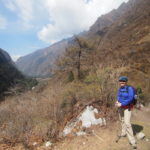The Unwelcome Tourist in an Italian Village

I was pleased when my friends and I arrived in the quiet Italian town of Ardea. We had spent a few days in Rome and the scorching, busy streets had taken a toll on me. I slept on the bus to Ardea and woke up in time to admire the coastline, with its soft, late-afternoon ripples on the water, so inviting after the forty degree heat of Rome we’d endured.
My friend’s family had a house there, a one-storey, cozy home, twenty minutes from the beach. Ardea was a well-kept secret. It was one of the closest coastal towns to Rome, but was seldom visited by tourists. How lovely, we all thought, how picturesque, how truly Italian. Such a welcome atmosphere after the touristy bustle of Rome.
After two days, however, it became clear that we were disrupting the small town. We were the only tourists in Ardea; a group of seven young adults, speaking an enthusiastic mix of French and English, running up the streets, dancing in our yard and wearing sophisticated outfits in the evening. We contrasted greatly with the modest, simple ways of locals, and they stared at us from a distance everywhere we went, with amusement, disbelief and, sometimes, disapproval.
It became clear that we were disrupting the small town. We were the only tourists in Ardea; a group of seven young adults, speaking an enthusiastic mix of French and English, running up the streets, dancing in our yard.
As Ardea was not used to tourists, people did not understand English. Not knowing how to speak Italian did not help lift the ambient defiance around us. When our Italian friend got tired of translating everything, all day long, she demanded more autonomy from us. Our struggle intensified as we tried to communicate with locals. We gesticulated helplessly, thrusting our hands in the air while slurring an odd mix of Spanish and English. We suffered misunderstanding after misunderstanding, ordered random dishes off the menu, pointed at things we needed to buy. This only increased our otherness, our foreignness in the eyes of the locals. Our poor Italian even got us lost, as we boarded the wrong bus and found ourselves standing in front of an abandoned funfair in the middle of the night.
“We don’t like Parisians, here.” The same reply, over and over again. “Go home”, they could have said.
The word travelled fast in Ardea, as it would in any village, and everybody knew who we were and where we were staying. To our greatest surprise and dismay, knowing more about us did not make the locals want to befriend us, but gave them enough information not to feel like they had to. It gave them the impression of knowing enough already, that they knew our kind. It gave them the right to despise us. We even got brutalized by a gang of kids who decided it would be hilarious to shoot us with their plastic-bullet guns on our way home every day.
In my experience, being foreign had always been an effective ice breaker. I was used to sparking smiles and nostalgic travel recollections whenever I answered the common “where are you from?” “Oh, Paris, how lovely. I haven’t been to Paris in a while now but…”
We gesticulated helplessly, thrusting our hands in the air while slurring an odd mix of Spanish and English. We suffered misunderstanding after misunderstanding.
In Ardea, as we tried to mingle during the yearly bonfire festival on the beach, we were asked this question. “Where are you from?” But it was not so much a question as an affirmation. It felt harsh and almost spiteful, so far away from the usual inquiry, a small-talk commonplace, but always genuine and eager. And the answer, Paris, breaking onto a wall; a cold, cold wall. “We don’t like Parisians, here.” The same reply, over and over again. “Go home”, they could have said. We would have felt all the same.
I cannot help but ponder upon the conditions of our stay in Ardea. I wish there was a twist in my story, where we picked up a few Italian words, patched up a sentence, brought an Italian dish to a neighbourhood potluck, along with our good intentions, and made peace. But none of that happened, and the dissent remained. The problem was that we regarded locals as our hosts, but to them we were only strangers. I think we might have been too self-entitled, unwilling to observe, listen and humble ourselves.
I do not regret my trip to Ardea, though. If anything, it allowed me to experience something that my privileges had kept at bay: exclusion. I realized that some people go through this unnerving, miserable feeling of exclusion every day, as they are shunned from a country or a community they are trying to integrate. And, if I had failed to adopt the modest ways of villagers, in hindsight, Ardea humbled me.








